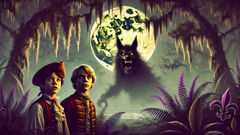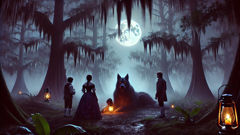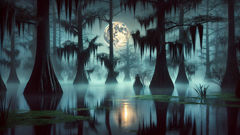Introduction
In the heart of Louisiana, where ancient cypress trees stand sentry over slow-moving bayous, and Spanish moss hangs like tattered veils from their outstretched limbs, the night comes alive with sounds both familiar and strange. Here, the land breathes with secrets—stories that ride on the fog rolling off the water at dusk, tales that linger beneath the surface like alligators in the shallows. In these swamps, French and Acadian settlers, Creole families, and Native peoples have woven their lives together for generations, building a rich tapestry of culture and superstition. Among their whispered warnings and bedtime stories, none stirs more shivers or commands more obedience than the legend of the Rougarou. To some, he’s a beast—half man, half wolf—cursed to roam the marshes beneath the full moon, preying on those who stray from the path or break the sacred Lenten fast. To others, he is a lesson, a living punishment for those who dare defy tradition or morality. In every version, one thing remains the same: to speak his name is to invite his shadow. On warm, humid evenings when the chorus of frogs and cicadas grows restless, parents hush their children with tales of the Rougarou lurking just beyond the lantern’s glow. For the people of Belle Riviére, a tiny French-speaking village perched on the edge of an endless sea of reeds and black water, the Rougarou is more than myth. He is a living warning, the shape of fear itself—and as young Lucille and her brother Jean-Baptiste are about to discover, sometimes legends are more real than anyone dares believe.
The Shadow of the Beast
Lucille Landry had grown up with the Rougarou’s story pressed close to her heart like a worry stone. Her grandmother, Mémère Elise, told it with a voice as soft as moss yet edged with warning. Sometimes the Rougarou was a man, sometimes a woman, always someone who broke a promise or a rule—punished with fur and fangs until they could pass their curse onto another. In Belle Riviére, it was more than a tale to keep children home after sunset; it was a lesson passed down with the gumbo recipe and the rosary beads.

As Lucille neared her twelfth birthday, she began to chafe at the warnings. She was clever and headstrong, never one to hide behind her brother Jean-Baptiste, who was three years older and as gentle as a summer rain. The two were inseparable, their days filled with fishing for catfish, racing pirogues along the tangled waterways, and exploring the fringes of the swamp where legend said the Rougarou’s lair lay hidden. Still, when dusk fell and fireflies flickered over the water, Lucille would hurry home, heart thumping, eyes darting to the shadows.
It was on a sticky August evening that the first sign came—a string of livestock found slaughtered on the edge of the village, their bodies torn and strewn as if by some wild beast. The men muttered about wolves, though none had seen a wolf in these swamps for generations. The women clutched their crosses and whispered the Rougarou’s name with trembling lips. Lucille watched as her father, Monsieur Landry, joined the search party, shotguns slung across their backs, lanterns bobbing in the dark. Jean-Baptiste, tall for his sixteen years and with a steady hand, helped patch the fence and comfort their frightened neighbors.
That night, Lucille couldn’t sleep. Every creak of the wooden house, every sigh of wind through the trees set her nerves on edge. Outside her window, she thought she heard something move—a shape darting between the reeds, the glint of eyes reflecting the moon. She squeezed her grandmother’s talisman, a small pouch of gris-gris meant to ward off evil, and prayed.
Days passed, and the fear in Belle Riviére grew. More animals were found dead, and now the damage crept closer to the village. A sense of unease settled over the people; old feuds flared, and suspicion found easy purchase. It wasn’t long before the villagers began looking sideways at strangers, at those who kept to themselves, at old Alphonse Thibodeaux who never went to Mass, and Madame Broussard whose husband had vanished years ago. Lucille saw it in their eyes—the question: who among us is the Rougarou?
One afternoon, as the clouds gathered heavy and dark over the bayou, Lucille and Jean-Baptiste found themselves alone at the edge of the woods. Jean-Baptiste was mending a fishing net, his fingers deft and patient. Lucille poked at the mud with a stick, restless. “Do you think the Rougarou is real?” she asked suddenly. Her brother looked up, his brown eyes thoughtful. “I think fear is real,” he said, “and sometimes it wears a mask.”
That night, a storm blew in from the Gulf, lashing rain against the clapboard houses, filling the air with the scent of wet earth and ozone. Lucille huddled close to her brother as the wind howled like a wounded animal. In the morning, they found tracks—deep, clawed prints—leading from the chicken coop into the woods. The villagers gathered around, their voices sharp and frightened. Someone claimed to see a hunched figure slip through the cypress trees at dawn.
Mémère Elise clutched Lucille’s hand. “Stay close, ma chérie. The Rougarou hunts in this weather.” Lucille shivered but something inside her steeled. She watched as her father and Jean-Baptiste set off again, lanterns bobbing through the mist. This time, she couldn’t stay behind. Curiosity and courage, or perhaps foolishness, pulled her after them.
Lucille slipped from the house and followed at a distance, keeping to the shadows. The woods were alive with the drip of rain and the croak of frogs. She moved quietly, heart pounding. Suddenly, a branch snapped nearby. Lucille froze. From behind a veil of Spanish moss, something watched her—a hulking shape with eyes that glowed amber in the gloom. She wanted to run but her feet wouldn’t move.
A hand clamped on her shoulder. She spun, ready to scream, but it was Jean-Baptiste. His face was pale, jaw clenched. “What are you doing?” he hissed. Before she could answer, the beast charged.
In the Heart of the Bayou
Jean-Baptiste grabbed Lucille’s hand and pulled her behind a fallen cypress as the beast crashed through the underbrush. The Rougarou’s howl split the air—a sound part anguish, part fury. Lucille’s legs trembled as she clung to her brother, her mind racing between terror and disbelief. They could smell its musk—earthy, wild, tinged with decay.

The siblings crawled through tangled roots and swamp grass, every muscle straining to move silently. The Rougarou’s heavy footsteps circled, searching, snuffling. Rain pattered on the canopy above, dripping onto Lucille’s cheeks and hair. Jean-Baptiste gestured for silence, then nodded toward a cluster of cattails near a shallow slough. They waded in, hearts pounding, mud sucking at their shoes.
For a long time they waited, barely daring to breathe. The beast passed by, its shadow falling over them like a shroud. Lucille dared a glance—its body was hunched, covered in coarse fur, but its hands were almost human, tipped with claws. She saw something in its eyes—pain and loneliness mingled with animal rage.
The Rougarou moved off, loping deeper into the swamp. Jean-Baptiste whispered, “We have to tell Papa.” Lucille nodded, but something in her heart tugged her back. Why hadn’t the beast attacked? What was it searching for? They made their way home under cover of rain and fog, slipping back into bed before dawn broke over Belle Riviére.
The next day, news swept through the village—someone had been attacked near old Maman Ledet’s house. She was alive, but wild with fear, her arm marked by deep scratches. The men gathered again, their faces grim. “We’ll hunt it tonight,” Monsieur Landry declared. Lucille and Jean-Baptiste exchanged worried glances.
That evening, Mémère Elise pulled Lucille close. “Some say the Rougarou is cursed for breaking a sacred promise,” she whispered. “But sometimes, it’s an innocent soul—trapped by another’s cruelty.” Lucille listened, shivering. “Can the curse be broken?” she asked. Her grandmother nodded, eyes dark with memory. “Oui, ma chérie. If someone shows compassion—if they see the human inside the beast.”
Jean-Baptiste and Lucille made a pact: they would find the Rougarou before the hunters did. Armed with only their wits, a lantern, and Lucille’s gris-gris pouch, they slipped out as night fell. The bayou was transformed by darkness—familiar paths swallowed by shadows, every sound magnified. They followed the tracks, deeper into the swamp than they had ever dared.
Frogs croaked, and unseen things rustled in the reeds. The siblings walked in silence, Lucille’s hand clenched tight around Jean-Baptiste’s. Suddenly, a cry echoed from across the water—a cry that was more human than animal. They ran toward it, stumbling over roots and through waist-high ferns.
In a clearing illuminated by the pale moon, they found the Rougarou—its leg caught in a hunter’s trap. Blood stained its fur; its chest heaved with pain and fear. Lucille saw tears in its eyes—real tears that glistened like dew. The beast snarled but did not attack.
Jean-Baptiste knelt at the edge of the clearing, raising his empty hands. “We want to help,” he said softly. Lucille stepped forward, her voice trembling. “You’re not alone.”
The Rougarou’s growl softened to a whimper. Lucille approached slowly, pulling the gris-gris from her pocket. “This will protect you,” she whispered, tying the pouch around its neck. With trembling hands, Jean-Baptiste pried open the trap while Lucille soothed the beast.
The transformation was sudden and terrible—bones shifting, fur receding, claws shrinking to fingers. Before their eyes, the Rougarou shrank into the form of a man—a gaunt, wild-eyed stranger they had seen in Belle Riviére only once before. He sobbed, clutching the pouch.
“My name is Emile,” he gasped. “I broke a vow to my dying wife, and this is my punishment.”
Lucille knelt beside him, wiping mud from his face. “You’re free now,” she said. “But you must help us protect our village.” Emile nodded, gratitude shining in his eyes.
As dawn crept over the bayou, the siblings led Emile home—hidden from sight, but no longer hunted. When the hunters returned, they found only empty tracks and a sense that something had shifted in the swamps.
Conclusion
The days that followed were quiet in Belle Riviére. No more livestock went missing; the woods seemed less threatening. Some folks whispered that the Rougarou had moved on or that the prayers of the faithful had chased him away. Only Lucille, Jean-Baptiste, and Emile knew the truth—that compassion could break even the oldest curse. Emile stayed with them through harvest, working the fields and learning the ways of the bayou. In time, he became a part of their family, his haunted eyes softening as he rediscovered kindness and forgiveness. Lucille often wondered how many more Rougarous wandered the world—cursed not by magic, but by their own regrets and loneliness. She never stopped carrying her gris-gris pouch, nor did she forget the lesson learned deep in the swamp: sometimes, courage means looking past fear and seeing the humanity hidden beneath. The legend of the Rougarou would live on, told by firelight on sticky summer nights—but for Lucille and her brother, it would always be a story of hope.













